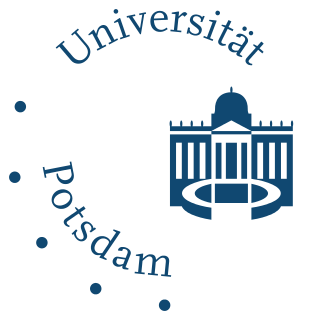TU Dresden, also as the Dresden University of Technology, is a public research university in Dresden, Germany. It is the largest institute of higher education in the city of Dresden, the largest university in Saxony and one of the 10 largest universities in Germany with 32,389 students as of 2018.

The Gottfried Wilhelm Leibniz Prize, or Leibniz Prize, is awarded by the German Research Foundation to "exceptional scientists and academics for their outstanding achievements in the field of research". Since 1986, up to ten prizes have been awarded annually to individuals or research groups working at a research institution in Germany or at a German research institution abroad. It is considered the most important research award in Germany.

The University of Potsdam is a public university in Potsdam, capital of the state of Brandenburg, northeastern Germany.

Technical University of Kaiserslautern was a public research university in Kaiserslautern, Germany.

Gerhard Ertl is a German physicist and a Professor emeritus at the Department of Physical Chemistry, Fritz-Haber-Institut der Max-Planck-Gesellschaft in Berlin, Germany. Ertl's research laid the foundation of modern surface chemistry, which has helped explain how fuel cells produce energy without pollution, how catalytic converters clean up car exhausts and even why iron rusts, the Royal Swedish Academy of Sciences said.
The Berlin Graduate School of Natural Sciences and Engineering (BIG-NSE) is part of the Cluster of Excellence "Unifying Concepts in Catalysis" (UniCat) founded in November 2007 by Technische Universität Berlin and five further institutions in the Berlin area within the framework of the German government‘s Excellence Initiative.
Manfred Baerns was a German chemist.

Dorothea Fiedler is a chemical biologist and also the first female director of the Leibniz-Forschungsinstitut für Molekulare Pharmakologie in Berlin, Germany.
Sophie Carenco is a researcher at the French National Center for Scientific Research, working on nanochemistry at the Laboratory of Condensed Matter Chemistry of Paris. Her research focuses on novel synthetic routes of exotic nanomaterials for energy application such as CO2 capture.
The Berlin University Alliance is a consortium of three universities and one hospital in Berlin: the Free University of Berlin, the Humboldt University of Berlin, the Technische Universität Berlin, and the Charité – Berlin University of Medicine.

Robert Schlögl is a German chemist known for research in catalysis. Currently, he is the Director and Scientific Member of the Fritz Haber Institute of the Max Planck Society in Berlin and the Max Planck Institute for Chemical Energy Conversion in Mülheim an der Ruhr. He became president of the Alexander von Humboldt Foundation in 2023.

María Escudero-Escribano is a Spanish chemist. Her research considers the design of materials for catalysis, fuel cells and sustainable chemistry. She works at the Catalan Institute of Nanoscience and Nanotechnology (ICN2) as an ICREA Research Professor since September 2022. Formerly she was director of the Nano-Electrochemical group at the University of Copenhagen.

Matthias Scheffler is a German theoretical physicist whose research focuses on condensed matter theory, materials science, and artificial intelligence. He is particularly known for his contributions to density-functional theory and many-electron quantum mechanics and for his development of multiscale approaches. In the latter, he combines electronic-structure theory with thermodynamics and statistical mechanics, and also employs numerical methods from engineering. As summarized by his appeal "Get Real!" he introduced environmental factors into ab initio calculations. In recent years, he has increasingly focused on data-centric scientific concepts and methods and on the goal that materials-science data must become "Findable and Artificial Intelligence Ready".
Peter Strasser is a German chemist. He is the winner of the 2021 Faraday Medal.
Juri Rappsilber is a German chemist in the area of mass spectrometry and proteomics.
Arne Thomas is a German chemist who researches porous and nanostructured materials for catalytic applications.
Janina Kneipp is a German scientist who is Professor of Physical Chemistry Humboldt University of Berlin. Her research considers surface enhanced Raman scattering and plasmonic enhancement in multi-modal micro spectroscopy.
Ulrike I. Kramm is a German chemistry professor at Technische Universität Darmstadt. Her research considers the development and characterisation of metal catalysts for fuel cells, CO2 conversion and solar fuels.
Anna Fischer is a German chemist who is a Professor of Nanomaterials at the University of Freiburg. Her research considers the development of nanomaterials for electrocatalysis.

Professor Günther Rupprechter is an Austrian scientist, full professor and currently Head of the Institute of Materials Chemistry, Technische Universität Wien. He has worked in physical chemistry, surface science, nanoscience and nanotechnology, particularly in the area of catalytic surface reactions on heterogeneous catalysts, identifying fundamental reaction steps at the atomic level by in situ and operando spectroscopy and microscopy.









